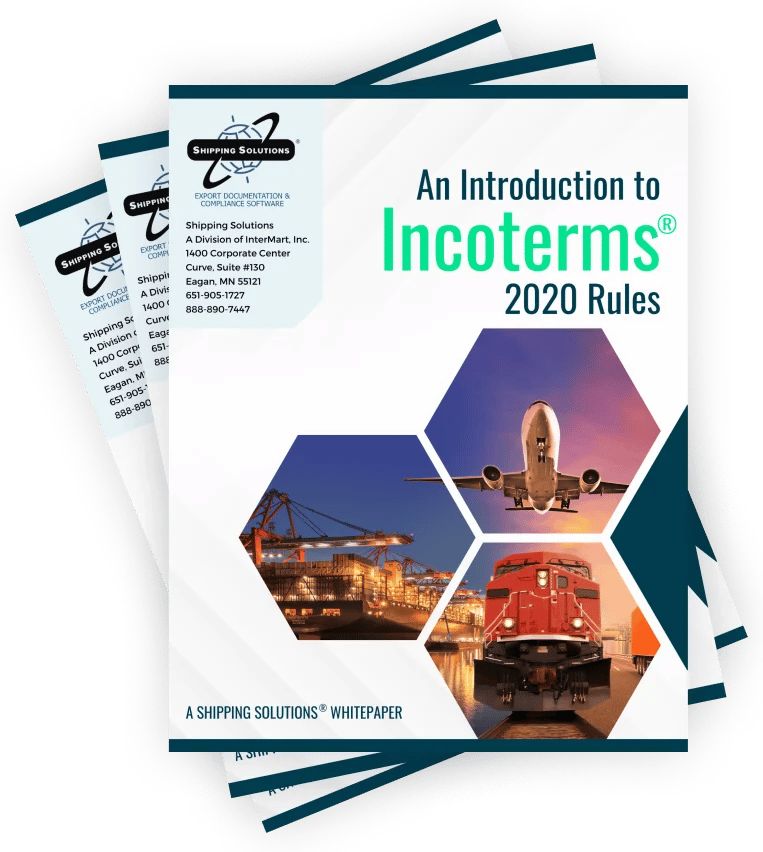The International Trade Blog Import Procedures
Incoterms 2020: Here's What's New
On: October 9, 2019 | By:  David Noah |
6 min. read
David Noah |
6 min. read
 The International Chamber of Commerce (ICC) has released the new Incoterms 2020 rules that identify the responsibilities of buyers and sellers for the delivery of goods in international trade. The terms also identify when the risk for those goods transfer from the seller to the buyer.
The International Chamber of Commerce (ICC) has released the new Incoterms 2020 rules that identify the responsibilities of buyers and sellers for the delivery of goods in international trade. The terms also identify when the risk for those goods transfer from the seller to the buyer.
The new terms took effect on January 1, 2020. If you are new to the concept of Incoterms, take a moment to download and read the free ebook: An Introduction to Incoterms 2020 Rules.
The last set of Incoterms went into effect in 2010. Although the ICC has released new Incoterms every 10 years for the last few sets of trade terms, that is a relatively recent occurrence, and the ICC could choose to update the terms any time they think current international trade practices warrant it.
It's important to remember that Incoterms are voluntary, and they don't replace a sales contract. Instead, international sales contracts often specifically reference a set of Incoterms as a shorthand for who is responsible for what in the delivery of the goods. If the buyer and seller choose to reference an earlier set of terms, like Incoterms 2010, or they choose to ignore Incoterms completely and spell out who is responsible for what directly in their sales contract, that is within their rights.
What's New in Incoterms 2020 Rules
After months of speculation about what would be included in the Incoterms 2020 rules that often included the possibility of completely eliminating certain terms and combining some others, the changes are actually pretty modest. At least they appear to be modest at first glance. The actual impact of the changes won't be known until they begin to be incorporated in actual import-export transactions.
This article only discusses the changes found in Incoterms 2020 rules. For more information about the 11 individual Incoterms, click on the links below:
DAT Becomes DPU
The most obvious change to the old Incoterms is renaming the term Delivered at Terminal (DAT) to Delivered at Place Unloaded (DPU). The ICC renamed this term because it became apparent that sometimes the buyer and/or seller want the delivery of goods to occur somewhere other than a terminal.
This term is often used for consolidated containers with multiple consignees, and it is the only term that tasks the seller with unloading the goods.
FCA and On-Board Bills of Lading
Perhaps the most significant change relates to the term Free Carrier (FCA). Under this term, the seller is responsible for either making the goods available at its own premises or at a named place. In either case, the seller is responsible for loading the goods on the buyer's transport.
Problems occurred with this term when the seller was responsible for loading the goods on a truck or some other transport hired by the buyer and not directly on the international carrier. If the seller and buyer had agreed on using a letter of credit as the payment method for this transaction, banks often require the seller to present a bill of lading with an on-board notation before they can get paid.
An international carrier won't typically provide a seller who did not present the goods directly to them with such a bill of lading. Under the new Incoterms 2020 rules, FCA allows the parties to agree in the sales contract that the buyer should instruct its carrier to issue a bill of lading with the on-board notation to the seller.
Different Levels of Insurance Coverage
Cost Insurance and Freight (CIF) and Carriage and Insurance Paid To (CIP) are the only two Incoterms that identify which party must purchase insurance for at least part of the export journey. In both cases that responsibility falls on the seller.
Incoterms 2010 specified that under both these terms the seller was responsible for obtaining the minimum level of coverage identified by Clause C of the Institute Cargo Clauses.
In Incoterms 2020 rules, the seller is now responsible for purchasing a higher level of insurance coverage—at least 110% of the value of the goods as detailed in Clause A of the Institute Cargo Clauses—under the revised term CIP. The insurance requirement hasn't changed for CIF.
DIY Sellers
In previous versions of the Incoterms, the ICC assumed that sellers would be contracting with a third party for the delivery of the goods to the appropriate place, and the language used in Incoterms 2010 reflected that.
Incoterms 2020 rules, on the other hand, recognize those do-it-yourself (DIY) sellers who may use their own transport to deliver the goods. The terms now expressly state that sellers can make a contract for carriage or simply arrange for the necessary transportation.
Security Requirements
Import and export security requirements have increased significantly and become more formalized during the past decade, and Incoterms 2020 rules specifically call out those requirements in its discussion of buyer and seller responsibilities under each of the trade terms.
Incoterms® 2020
The final set of changes to Incoterms 2020 rules relate to how the terms are organized and described in the ICC's official publication called, believe it or not, Incoterms® 2020. The ICC claims these revisions to the text make the terms easier to understand and use.
Learn More about Incoterms 2020
If your job requires that you understand and use Incoterms, you should definitely get a copy of ICC's Incoterms® 2020 book. If you are looking for help understanding which term or terms your company should be using in your international transactions, register now for an Incoterms® 2020 Rules webinar offered by International Business Training.
For a basic understanding of the Incoterms 2020 rules, download the free Chart of Responsibilities and Transfer of Risk. While the chart summarizes the responsibilities for the seller and the buyer under each of the terms, it cannot capture the details of each term like the book and training classes can. Use it as a supplement to additional Incoterms training.

About the Author: David Noah
As president of Shipping Solutions, I've helped thousands of exporters more efficiently create accurate export documents and stay compliant with import-export regulations. Our Shipping Solutions software eliminates redundant data entry, which allows you to create your export paperwork up to five-times faster than using templates and reduces the chances of making the types of errors that could slow down your shipments and make it more difficult to get paid. I frequently write and speak on export documentation, regulations and compliance issues.



